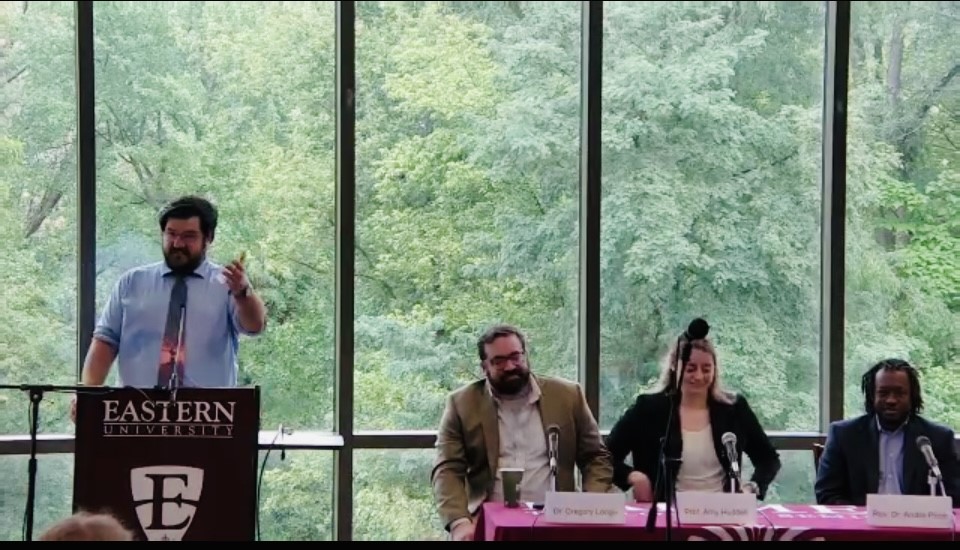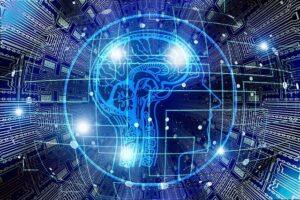
My knowledge of Artificial Intelligence (AI) is limited but I wanted to add to it. I was particularly interested to learn of its impact on my ministry as a theological educator. So, when I learned that Palmer Theological Seminary was offering a webinar on this subject, I registered for it, and I was not disappointed. In this journal post, I share my reflection as a theological educator after learning a little more from the webinar. My reflection covers AI and its impact on theological education, the potential for bias and ethical concerns. I also provide some brief suggestions for its use.
of its impact on my ministry as a theological educator. So, when I learned that Palmer Theological Seminary was offering a webinar on this subject, I registered for it, and I was not disappointed. In this journal post, I share my reflection as a theological educator after learning a little more from the webinar. My reflection covers AI and its impact on theological education, the potential for bias and ethical concerns. I also provide some brief suggestions for its use.
I initially became very curious and intrigued by virtual assistants like Siri and Alexa. Siri can understand natural human language and complete requested tasks, such as answering questions, reading messages, making calendar appointments, and setting reminders. Alexa is an interactive voice assistant that can check the weather, launch your favorite playlist, and everything in between. My grandkids are already using these with so much ease. I often hear them say to Alexa, “Alexa, play Dance Monkey” Even the adults in my family are using it. Just the other day, the music on a Bose speaker was loud and I overheard a family member who was taking a phone call, shouted at Alexa to stop. Well, whether we like it or not, we are living in the digital age and AI has made its landing at a rapid pace.
In the webinar, I learned more about ChatGPT which stands for Generative Pre-trained Transformer. It uses natural language processing to create humanlike conversational dialogue. The language model can respond to questions and compose various written content, including articles, social media posts, essays, codes, and emails. There are other alternates to ChatGPT.
As mentioned, I was particularly interested in AI as I was keen to learn how this technology is going to impact my ministry as I prepare to serve as a global servant in theological education with International Ministries. Like many of us, I want to know how to use this technology to enhance my work and at the same time look at the downside of this technology. As someone who values community and whose lived experience fully embraced this, I want to explore the impact of AI on human connection.
As a theological educator, whenever I begin a class with seminary students especially in a course that I teach called, Contexts, Perspectives and Ministries in the 21st Century, I talk about the Tri-Exegetical task of a thoughtful practitioner. I stress that exegeting scripture must be an important task in preaching and teaching but two other areas, the interpreter and his/her context needs to be exegeted as well. One’s lived experience and context can sometime show and affect the interpretation of scripture and view of ministry. In this process, there is interaction with the different voices being added to the learning of scripture, of ourselves, and our individual contexts. AI can certainly assist to a certain extent, but I believe will not allow for the rich communal learning.
I hesitate to fully endorse AI. When I stated that during the exegesis exercise mentioned above that AI can assist but not replace communal learning. For this reason, I want to suggest that the downside of AI is the lack of human connection. Secondly, AI uses specialized algorithms to find patterns within data sequences. And so, if there is a dominant pattern within a theological issue or contextual issue, then the transformer will pull from a significant amount of data to formulate a response. I see potential for bias as it relates to theology, contextual issues, people groups, culture, and tradition.
Christian missiology/theology places high value on the dignity of each human being, believing that all people are created in the image of God. The internet has sometimes been abused to devalue or dehumanize individuals. AI has the potential to devalue or dehumanize individuals. During Covid, when work and faith activities were virtual, the human interaction and connections were impacted. There is a concern that AI will further diminish human interaction and community life of the church and missional engagement. International Ministries which is my sending mission agency has been at the forefront of missional engagement that allows community and human interaction in sharing the good news of Jesus Christ.
We should not be surprised at the rapid advancement of humans. After all, we, humans are created in the image of God. We are blessed with the capacity for creativity and innovation. It is said that AI is a human creation and can be seen as an extension of this creative capacity, allowing humans to emulate some aspects of God’s creative abilities. I must add that, that there are limitations otherwise some may claim to be God.
I am also concerned about ethical issues related to privacy, surveillance, bias in the algorithms, and the potential for this technology to be used for harmful purposes. I believe that reliance on AI can prevent students from being critically engaging with the materials if they rely on AI for their responses.
We all know that there is a diversity of theological perspectives within Christianity, and not all Christians will have the same views on AI. Some may be more cautious or skeptical of AI, while others may embrace it as a means of advancing human knowledge and well-being. As a theological educator who is open to engaging with diverse theological perspectives as I find this very enriching, AI will provide that space to engage and sharpen perspectives.
AI can also be useful for research but the impact of it on faith, in my opinion, will be felt by consumers of this technology. Recently I reviewed an article on a website about AI. It promoted the belief that God is in all things which to me is pantheism. Pantheism is a belief that God is everything and everything is God. From a monotheistic perspective, I will argue that such a belief where objects, images, AI, etc., are given divine status is pantheism because according to pantheism, God is in everything. These objects and images can reflect God’s glory, but they are not Gods as they are impersonal and lack the human connection. Granting them divine status goes against my belief in monotheism.
We cannot disregard the fact that computers play a vital role in our everyday lives. It has largely enhanced how we work etc. I believe AI too, will do the same. Despite some of my concerns, we should be open to it’s potential as we seek to enhance our understanding of ourselves, our relationships with each other, and our connection to the divine. As we navigate the challenges and opportunities presented by AI, we must always remember our responsibility, to use this tool wisely and ethically, ensuring that these serve the common good and contribute to the flourishing of all God’s creation.
AI has the potential to make Rodney’s life better but will never make Rodney better for that is the ministry of the Holy Spirit in my life and it helps me understand what it means to be human in need of God. In my ministry as a theological educator, I will be careful to ensure that my Christian perspective on artificial intelligence is shaped by theological principles, ethical considerations, and a commitment to upholding human dignity and moral responsibility.
If God leads you to join me on my journey as a theological educator, please prayerfully consider supporting me by clicking HERE. Thank you for your prayers and support.